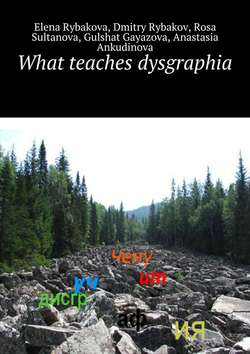What teaches dysgraphia

Реклама. ООО «ЛитРес», ИНН: 7719571260.
Оглавление
Elena Rybakova. What teaches dysgraphia
Introduction
Multiple reading and different writing. Project organization of accompanying children with dysgraphy
Ethics, aesthetics and the perspective of written communication, or what, why and in what style we exchange information
The application of Elena Rybakova’s “Phonemic Riddles” for development of morphological and grammatical vigilance of schoolchildren on the letter
Selection of text for reading in difficult cases violation of the letter from schoolchildren at speech therapy and in the family
School logistics as developing resource of personality and educational status of pupil
Cultural synergy mediae tnicheskoy educational supported communicationation
Verbal immunity against the involvement of citizens in sects and other depressed, entropically organized communities
Features of thinking of younger schoolchildren of our time and the choice of texts for the development of their written communication
And improvisation in the network as an evolving, diagnostic and corrective component of the development of the communicative competences of the child
Integrated impact of quality of speech in modern Russia
Auto-learn the mistakes when reading high school students and adults as a psychological workshop
Brevity is not only the sister of talent: small forms of verbal creativity of schoolchildren as a correction- developing resource
The primacy of calligraphy
Ambiguous details of the social and educational dialogue
Regional component in the organization of the correctional- educational space
The General Information Resource of the Russian Language
Prevention of verbal violations during the publishing process in kindergarten
The need for foreign language and technical leksika in micro-social environment as a condition of speech and intellectual development of children
Bibliography
Список литературы
Отрывок из книги
Domestic and international science has reached significant heights in the study and methodology of problems associated with violations of written communication in both children and adults.
Nosology cal aspects of modern research, etiological, structured, methodical approach s allow Vat effectively ensure social and educational needs of children and adults with dysgraphia, actualizing not only have stored on uchayuschihsya resources, but also adaptive, and overcompensation tional opportunities.
.....
The choice of writing tools – immediate, but bright, sensori-motor satisfying, satisfictionared component of the more effective, there is for the givens on the efficiency, accuracy, carefully, pattern matching. Finds and interesting effects it makes sense to analyze after the fact, after the child will experience both sensory and subject- activity- compiling unusual way organized Foot letter, the results, felt his new activity- status in the loading area for themselves and get a motivational impulse to self-development, self-organization in this – and other areas of activity.
The transition to more pronounced components of autonomy, selectivity, design in the organization of the child’s activity in this training occurs more often spontaneously, and pedagogical developmental and corrective support is provided with minimal inclusions, only if necessary. Even with the incomplete rightness of the decision, the choice of the student – style, for example, or design, writing in complex versions of written projects, it makes sense to provide a pedagogical pause, for the current self-analysis, then tactfully propose options, adjustments, weighted building intersubject dialog. Of course, aerobatics of the correctional, and in general developing process – when the teacher or the parent consults the child as little as possible during the didactic” quest " – and in the right places is justified but says: “Wow, you!” And” Will you come myself small?”, “How did you guess?”. Or let the child indulge in contemplation, replication, demonstration and discussion of the product of his labor as much as he really needs – and not as much as corresponds to age and disciplinary standards. We often do not know what kind of internal work he is doing at the same time, what conclusions and decisions should come on his personal program.
.....